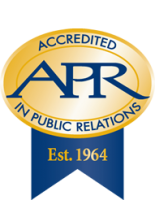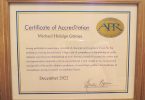
Letters are a big deal, right? Whether school letters, Greek letters, professional letters, they become symbols that deliver a sense of pride, a sense of belonging. In high school, wearing your letters was laying claim to your friends, your teachers, often your teenage world. The same was true in college, where letters bearing the names of sororities and fraternities created another level of self-identification. (Although I did not join a sorority in college, the letters were meaningful symbols to me and most others on campus.)
Professional letters came later — CPA, MD, MBA, Ph.D. Like the letters before them, these tell another person a great deal of information. If I see these letters with someone’s name, I can likely quickly discern the type of work they do and their level of education. As a journalism student studying public relations in college, professional letters weren’t on my radar. It wasn’t until several years later — almost 10 years ago now — that I haphazardly joined the world of school public relations. And shortly after that, I learned about the APR credential — Accredited in Public Relations.
And now I’ve officially earned the right to add APR to my name. I have my own special letters.
So, for my friends and colleagues who don’t work in public relations, here’s the skinny:
• I was Advanced from a Readiness Review panel of my peers (peers who already had received their APR).
• I passed an extensive computer-based Examination for Accreditation in Public Relations.
• I now can tell you a thing or two about Grunig’s situational theory of publics, the difference between line and staff functions and why P.T. Barnum was way more than just a circus guy.
It’s a credential that is widely recognized across all disciplines of public relations. Someone once told me that in certain circles the APR is more highly regarded in the public relations profession than a master’s degree. (In fairness, it’s entirely possible that these particular circles may consist of APRs who do not have master’s degrees … but I’m fine not knowing that for now.)
Most importantly, my APR means I’ll continue fine-tuning my work to be strategic, and to practice professional ethics. It’s a commitment to continued learning throughout my career to ensure that I deliver ever greater value to my employer — with focus and confidence as I do.
Now, for my PR friends and colleagues, the APR also might mean, “those letters I really should start working on.” At least, that’s what APR meant to me for much of the last 9-plus years, especially because I quickly noticed that many of the people who were helping me adjust, learn and grow in this new found school PR world also had APR behind their name. I admired the quality of their work, the value of their perspective — and I wanted to join their ranks. I wanted the letters.
Getting the APR was a long and winding road, mostly because the past 10 years have included having a baby, raising kids, buying groceries, doing laundry and working in a busy full-time job. (This is where I give a HUGE shout-out to all the single moms, working college students and others who find a way to fit these things together. You are amazing.)
But in spite of the unexpected and absorbing things life brings, I got there. And along the way, I was reminded, over and over, that I’m surrounded by incredibly generous colleagues — some friends, some strangers — who went out of their way to encourage and help me succeed. And now I’ll pay forward some of their kindness. If you’re thinking you might want the APR letters behind your name, here are my top five things to consider:
1. Start when the time is right. I leveraged a bit of a “mom window,” nestling the bulk of my work in a sweet spot between when my kids were old enough to be in school, but (mostly) young enough to avoid a family schedule packed with evening and weekend activities.
2. Enlist your boss’ support. Key to my shift from “That’s a goal of mine” to “I’m working on my APR” was having it written into my evaluation a few years back. It kept me on track, held me accountable and allowed me to spend some of my regular office hours on my panel and the Examination preparation.
3. Don’t let the time frame fool you. Candidates are given one calendar year to be Advanced from the Readiness Review panel and complete the computer-based Examination for Accreditation in Public Relations. This is more than enough time if you complete the panel shortly after you apply to be a candidate. Leaving yourself nine to 12 months to pass the Examination, you have all the time you need. Map out a study plan, schedule the Examination date and keep pushing forward
4. Expect a shock to your system when you begin studying, especially if you’ve been away from college for 10 or 15 years. I found myself longing for the discipline I once had as a successful college student. Flashcards, study guides and textbooks — the Examination preparation takes dedication, persistence and old-fashioned hard work. More than one APR has told me that a second try at the Examination is what they needed, after coming up short the first time. The goal is not to be perfect — the goal is to finish.
5. And most importantly, enlist the help, encouragement and support of the APRs around you. Find them through any of the UAB participating organizations (ARC, ARPPR, FPRA, MPRC, NSPRA, PRSA, RCC, SPRF). Find them on Twitter. Ask your friends. Without exception, current APRs were happy to provide whatever I needed to make the journey a little easier.
If you’re a communications professional, I encourage you to go for your APR when the time is right. And as much pride as I feel having these letters on a letter addressed to me, it truly pales in comparison to the perspective, knowledge and clarity I gained along the way.
Written by Kristin L. Magette, APR, director of communications, Eudora School District in Eudora, Kansas.








Great summary and motivation for non-APRs. Thanks, Kristin. Earning my APR was one of the best professional (and personal) decisions I’ve made in my 30+ year career!
Great summary and motivation for non-APRs. Thanks, Kristin. Earning my APR was one of the best professional (and personal) decisions I’ve made in my 30+ year career!